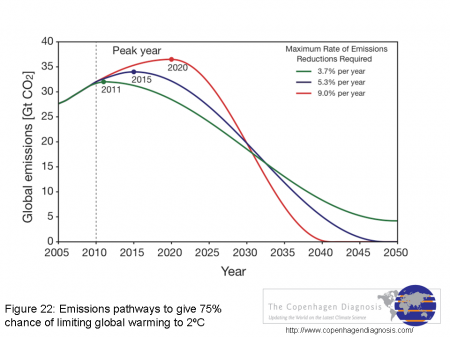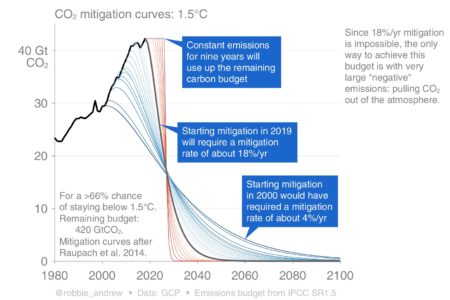Natural gas is often held up as a solution to climate change, or at least a transition in the right direction, on the basis of producing less CO2 per unit of energy than oil or coal. Other factors are also relevant, however. Natural gas is mostly methane (CH4) which is a much more powerful greenhouse gas than CO2. If just a few percent of the methane extracted is leaking in the form of ‘fugitive emissions’ from production facilities and pipelines that alone can make it a worse energy source than coal. Methane also has a different atmospheric lifetime. It’s actually much much worse than CO2 in the short term, but unlike CO2 which largely endures for centuries methane breaks down comparatively quickly. This may be relevant to global temperature pathways as the frontloaded impact of methane may make the peak of warming worse and raise the risk of positive feedback effects where the warming we cause induces further greenhouse gas emissions and warming which we cannot control.
There are more complicated arguments about long-term infrastructure, with some arguing that gas is substituting for worse alternatives and others saying big new gas investments are locking in our fossil fuel dependence for decades to come. There’s also always the debate about any prospective energy source versus renewables, with some arguing that options like gas or nuclear are not needed because renewables are becoming cheap so quickly, and others arguing that energy sources like gas or nuclear complement renewables. With gas, the argument is that it’s a deployable energy source you can activate only when renewables don’t supply demand (many gas plants are peaker plants that only run at times of peak demand); with nuclear, people say it’s always-on baseload energy that would provide at least something during renewable dips.
All this is highly relevant because gas production is exploding, especially because of North America’s hydraulic fracturing (fracking) boom. A new Global Energy Monitor report describes $1.3 trillion being invested in gas infrastructure around the world. In particular, massive investments are being made in liquified natural gas (LNG) infrastructure, since unlike gas in pipelines it can be exported by ship intercontinentally.
Canada is hosting a very disproportionate amount of this investment: 35% of the global total, despite our much smaller global population and domestic share of world greenhouse gas production.
Related:


